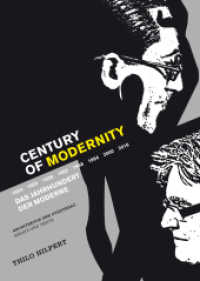- ホーム
- > 洋書
- > ドイツ書
- > Social Sciences, Jurisprudence & Economy
- > Politics, Society, Work
- > political science
Description
(Text)
How do children perceive access and participation rights in environmental matters? The study presented in this book aims to broaden the discourse on political participation in environmental issues to include the perspectives of children and young people. As part of a participatory qualitative study, six interviews were conducted with young activists to explore their perspectives on their rights in environmental matters. The theoretical framework of the study is the concept of 'Living Rights'. Different dimensions of children's understanding of rights in relation to a healthy environment are analyzed, and challenges that children encounter when invoking their rights to access and participation are revealed.
(Table of content)
Foreword (Prof. Dr. Manfred Liebel & Prof. Dr. Jörg Maywald)IntroductionLiterature ReviewChildren's Rights related to a healthy environmentIntersectional discrimination and environmental harmConceptions of rights - as framework and living practiceA framework for children's rights in environmental mattersAccess and participation rightsBroadening the discourse: Rights as living rightsEnvironmental activism and children's role: Reflections from literature and the public discourseChildren's activism for the environment and their access to justice: Recent examplesThe conceptions of environmental ethics and environmental activists: Findings in literatureResearch and methodologyContext of research and field accessLimitations of researchEthical aspects of involving children in researchResearch questionsResearch methodsInterview-designData-analysisResultsCategory 1: Conceptions of rightsSubcategory 1: Experience of the environment and environmental harmSubcategory 2: Entitlement and generativitySubcategory 3: Rights and formulations of justice as language for legitimation, as tool and as supportive frameworkCategory 2: Conceptions on activism as practice of participation and access rightsSubcategory 1: Activism as a result of a learning process, socialized through personal relationships and inspirations by othersSubcategory 2: Conceptions on approaches to activismSubcategory 3: Activism as a personal benefitSubcategory 4: Activism as a personal and societal challengeSubcategory 5: A call to action for accountability, rule of law, participation and a change of consciousnessSummary of findingsDiscussionThe experience of the environment: From an anthropocentric to a biocentric visionGenerativity and collectivity: Considering relations of injustice that reach beyond the presentThe need for a more inclusive vision of law and jurisdictionConclusionReferencesAbstract (Deutsch)About the author
(Author portrait)
Born in Bielefeld (Germany) in 1993, Frederike Lindau has spent much of her life in nature and experienced the interconnection between natural spaces and its inhabitantsearly. During a voluntary service, she had the opportunity to support an educational project in Chiapas, Mexico. This inspired her to study educational sciences in Berlin,Germany, with a focus on children's rights in emergency situations. After her Bachelor, she spent several years working in different projects promoting children's rights.








